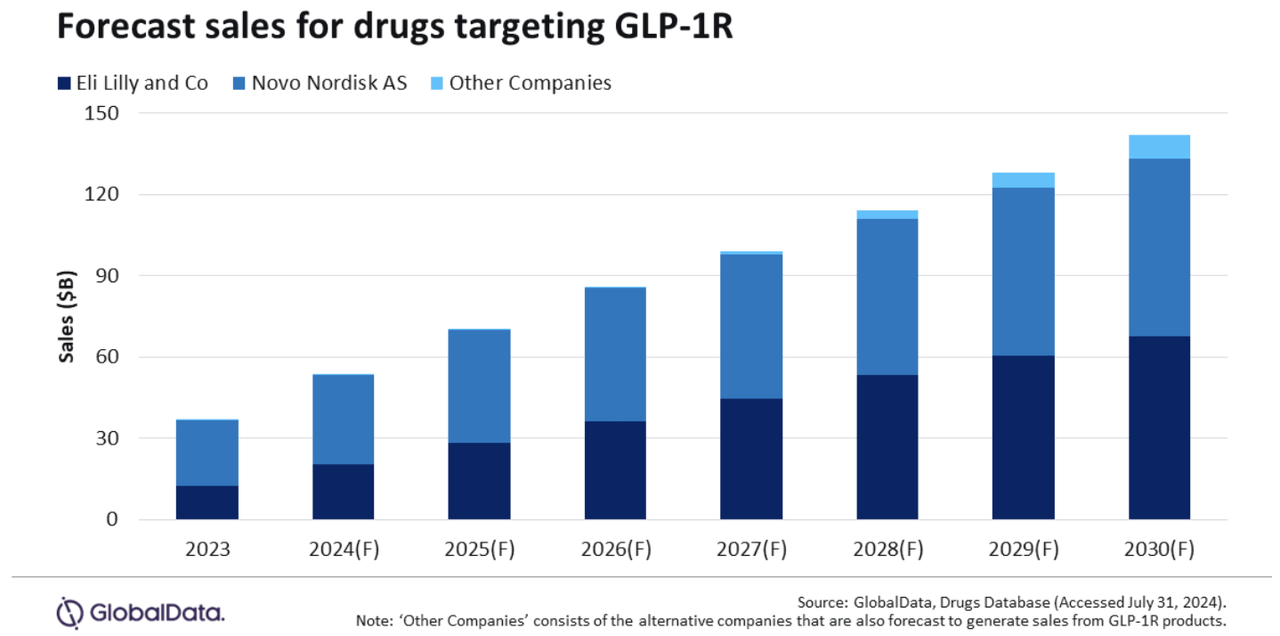
U.Ozel.Images/E+ via Getty Images
Although other companies are poised to have GLP-1 receptor agonist drugs for weight loss approved, they are not likely to make much of a dent in the dominance of Eli Lilly (NYSE:LLY) and Novo Nordisk (NVO) who control the market now.
In 2023, the two companies accounted for 99% of all GLP-1R agonist sales. By 2030, that figure is only projected to decline to 94% despite the likely entry of similar medications, according to GlobalData.
The category brought in $37.2B in sales in 2023, the data and analytics company noted.
Novo markets Ozempic and Wegovy (both semaglutide) for, respectively, type 2 diabetes and weight loss, while Lilly’s main GLP-1Rs are Mounjaro and Zepbound (both tirzepatide) for, respectively, diabetes and weight loss.
By 2030, GlobalData projects that 14 other companies will be marketing GLP-1Rs. However, these companies are expected to bring in only $8.8B in revenue, a figure “15 times less than the combined valuation of the two leading companies,” says GlobalData Pharma Analyst Jasper Morley.
GlobalData’s assessment mirrors that given in June by J.P. Morgan’s Holly Morris and Cantor Fitzgerald’s Louise Chen who spoke at the Seeking Alpha Investment Summit on the weight loss drugs market. Morris said that both companies’ size and getting to market first have likely cemented their control of the space, while Chen noted that differentiation will be key for any new entrants in the market.
Lilly (LLY) and Novo (NVO) also have their own advanced GLP-1R drugs in the pipeline. For the former, it has the oral pill orforglipron and the GIP/GLP-1/glucagon receptor agonist retatrutide in phase 3, as well as three other obesity drugs in phase 2. Novo has CagriSema, a combination of semaglutide and the amylin analogue cagrilintide as well as an oral version of semaglutide to be taken daily. The Danish company also has three other weight loss drugs in phase 2.
One of the most eagerly anticipated new obesity drugs to potentially come to market that is not from Lilly or Novo is Amgen’s (AMGN) MariTide, which is both a GLP-1R agonist and a GIPR agonist. It is currently in phase 2 for diabetes and weight loss.
However, that candidate is expected to generate only $3B in sales in 2030, according to GlobalData.
Other candidates to look out for include Viking Therapeutics’ (VKTX) phase 2 VK2735, which Seeking Alpha analyst Stephen Ayers recently gave a bullish assessment of. An oral version of the candidate is in phase 1. Roche (OTCQX:RHHBY) has three candidates in phase 1 development: a GLP-1R agonist, a dual GLP-1 /GIP receptor agonist (same mechanism of action as Mounjaro and Zepbound), and an anti-latent myostatin.
In addition, Zealand Pharma (OTCPK:ZLDPF) and Boehringer Ingelheim are developing survodutide while Altimmune’s (ALT) pemvidutide.

